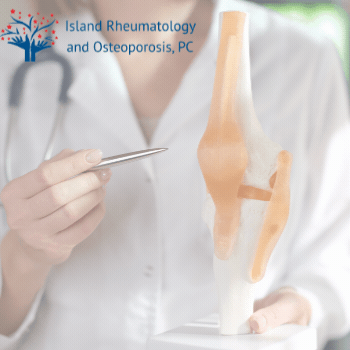Rheumatologist near Rocky Point NY

Welcome To Island Rheumatology and Osteoporosis, PC Rheumatologist Near Rocky Point NY
Welcome to Island Rheumatology and Osteoporosis, PC, your trusted destination for comprehensive care. At our state-of-the-art office, our rheumatologist near Rocky Point NY is dedicated to improving the quality of life for individuals battling rheumatic conditions. With a team of highly experienced and compassionate rheumatologists, we offer specialized medical expertise to diagnose, manage, and treat a wide range of autoimmune and inflammatory disorders. Whether you’re seeking relief from arthritis, lupus, or any other rheumatic condition, our clinic is committed to providing personalized, patient-centered care that addresses your unique needs. Discover the difference of expert care at Island Rheumatology and Osteoporosis, PC, and take the first step toward a healthier, pain-free future.
Meet Our Providers




SANJAY GODHWANI, MD
KYLE ESKRIDGE, PA
PUJA GODHWANI, NP
CRAIG OROFINO, PA
Living Well with Rheumatoid Arthritis: Strategies for Managing Chronic Pain and Inflammation
 In today’s fast-paced world, living with a chronic condition like Rheumatoid Arthritis (RA) can be a challenging journey. RA is a complex autoimmune disease that primarily affects the joints, leading to persistent pain and inflammation. While there may not be a cure for RA, numerous strategies and lifestyle changes can empower individuals to manage their symptoms effectively and enhance their overall quality of life. Continue reading to learn more about our rheumatologist near Rocky Point NY at Island Rheumatology and Osteoporosis, PC.
In today’s fast-paced world, living with a chronic condition like Rheumatoid Arthritis (RA) can be a challenging journey. RA is a complex autoimmune disease that primarily affects the joints, leading to persistent pain and inflammation. While there may not be a cure for RA, numerous strategies and lifestyle changes can empower individuals to manage their symptoms effectively and enhance their overall quality of life. Continue reading to learn more about our rheumatologist near Rocky Point NY at Island Rheumatology and Osteoporosis, PC.
Understanding Rheumatoid Arthritis
Before delving into the strategies for living well with RA, it’s crucial to understand the condition itself. Rheumatoid Arthritis is a chronic and prevalent autoimmune disorder in which the immune system attacks the lining of the membranes around the joints. This causes inflammation and pain, eventually leading to joint damage and deformities. RA typically affects multiple joints, and its symptoms can vary from person to person. Common symptoms include joint pain, swelling, stiffness, and fatigue. Over time, RA can also impact other organs, such as the heart and lungs.
Creating a Comprehensive Treatment Plan
Managing RA effectively starts with a well-rounded treatment plan tailored to your specific needs. This plan is typically developed in collaboration with a rheumatologist, a medical specialist with expertise in autoimmune diseases. Here are some critical components of a comprehensive treatment plan:
Medications – Disease-modifying antirheumatic drugs (DMARDs) are often prescribed to slow down RA’s progression and reduce inflammation. They can help prevent joint damage and improve overall function. Biologic DMARDs, such as adalimumab and etanercept, target specific immune responses and can be incredibly effective. Nonsteroidal anti-inflammatory drugs (NSAIDs) like ibuprofen can relieve pain and inflammation, although they do not slow disease progression.
Physical Therapy and Exercise – Physical therapy can be immensely beneficial for individuals with RA. A physical therapist can develop an exercise program to improve joint flexibility, strength, and overall mobility. Low-impact activities like cycling or swimming can also be gentler on the joints while providing valuable cardiovascular benefits.
Diet and Nutrition – A balanced diet plays a vital role in managing RA symptoms. While no specific diet can cure RA, certain foods may help reduce inflammation. Incorporating anti-inflammatory foods like fatty fish, colorful fruits and vegetables, and whole grains can be beneficial.
Rest and Stress Management – Adequate rest is crucial for managing RA, as fatigue is a common symptom. Ensure you sleep enough and listen to your body when it signals the need for rest. Additionally, managing stress through mindful relaxation techniques, meditation, or yoga can help reduce symptom flare-ups.
Assistive Devices and Adaptive Techniques – Living well with RA often involves making lifestyle adjustments. Assistive devices like ergonomic keyboards, jar openers, and adaptive utensils can make daily tasks easier on your joints. Moreover, pacing yourself and breaking tasks into smaller, manageable steps can help conserve energy and reduce the risk of overexertion.
Regular Monitoring and Communication – Maintaining open and frequent communication with your rheumatologist is crucial for tracking your RA’s progress and making necessary adjustments to your treatment plan. Regular check-ups can help monitor inflammation levels and ensure your medications are effective.
Contact Us
Living well with Rheumatoid Arthritis is possible, but it requires a proactive approach that combines medical treatment, lifestyle adjustments, and emotional support. Everyone’s journey with RA is unique, so working closely with our experts to tailor your approach to your specific needs and circumstances is essential. Our rheumatologist Rocky Point NY, is here to answer all your questions. Contact Island Rheumatology and Osteoporosis, PC today to learn more and request an appointment.
Navigating Joint Health in Your Golden Years
 When it comes to the golden years of life, one of the most crucial aspects that can significantly impact our overall well-being is joint health. Our bodies undergo various changes as we age, and our joints are no exception. Rheumatology near Rocky Point NY becomes increasingly relevant as we advance in years. Our experts will delve into the world of rheumatology and aging, equipping you with the knowledge and strategies to ensure optimal joint health in your golden years.
When it comes to the golden years of life, one of the most crucial aspects that can significantly impact our overall well-being is joint health. Our bodies undergo various changes as we age, and our joints are no exception. Rheumatology near Rocky Point NY becomes increasingly relevant as we advance in years. Our experts will delve into the world of rheumatology and aging, equipping you with the knowledge and strategies to ensure optimal joint health in your golden years.
The Impact of Aging on Joints
Aging is an inevitable process that affects every part of our bodies, including our joints. Here’s a closer look at how aging impacts joint health:
Wear and Tear – Our joints endure wear and tear over the years. This natural process can lead to the gradual breakdown of cartilage, which acts as a cushion between our bones. As cartilage wears away, joints become less flexible and more susceptible to pain and stiffness.
Reduced Lubrication – Another factor contributing to joint issues as we age is the reduction in synovial fluid production. Synovial fluid lubricates joints, allowing them to move smoothly. With age, the quantity and quality of this fluid decrease, leading to friction and discomfort.
Increased Risk of Arthritis – Arthritis is a broad term that encompasses more than one hundred different types of joint conditions. Osteoarthritis, the most common form of arthritis, becomes more prevalent as we age. This condition occurs when the protective cartilage that covers the ends of bones deteriorates, leading to pain and swelling.
Preventive Measures for Joint Health
While aging is inevitable, there are proactive steps you can take to preserve and promote joint health during your golden years. Here are some key strategies:
Maintain a Healthy Weight – Excess weight stresses your joints, especially those in the knees, hips, and lower back. Maintaining a healthy weight can reduce your risk of joint problems.
Stay Active – Regular exercise is vital for maintaining joint mobility and muscle strength. Low-impact activities like swimming and walking are gentle on the joints while providing numerous health benefits.
Balanced Diet – A well-balanced diet rich in anti-inflammatory foods, such as fatty fish, nuts, and fruits, can help reduce joint inflammation and pain.
Stay Hydrated – Proper hydration supports the production of synovial fluid, which keeps your joints lubricated. Make sure to drink an adequate amount of water throughout the day.
Regular Check-ups – Routine visits to a rheumatologist can help identify and address joint issues early on. Early intervention often leads to better outcomes in managing joint-related conditions.
Seeking Professional Guidance
In your journey to maintain optimal joint health, seeking professional guidance is essential. Rheumatologists are specialized physicians who can provide expert advice and treatment options tailored to your unique needs. If you experience persistent joint pain, stiffness, or swelling, don’t hesitate to schedule a consultation with a rheumatologist.
Contact Us
In the realm of rheumatology and aging, knowledge is power. By understanding how aging affects our joints and taking proactive steps to maintain joint health, you can enjoy your golden years to the fullest. Prevention and early intervention are vital to enjoying a comfortable and active lifestyle as you age. Be sure to contact Island Rheumatology and Osteoporosis, PC, to learn more from our rheumatologist near Rocky Point NY.
Contact Our Rheumatologist Near Rocky Point NY Today!
What Is Osteoporosis?
 Osteoporosis, a common bone disease characterized by weakened bones, is a significant concern for individuals worldwide, especially as they age. At Island Rheumatology and Osteoporosis, PC, we specialize in diagnosing and treating osteoporosis. Continue reading below to learn more about this condition and how our rheumatologist near Rocky Point NY can help.
Osteoporosis, a common bone disease characterized by weakened bones, is a significant concern for individuals worldwide, especially as they age. At Island Rheumatology and Osteoporosis, PC, we specialize in diagnosing and treating osteoporosis. Continue reading below to learn more about this condition and how our rheumatologist near Rocky Point NY can help.
Unveiling the Silent Threat
Osteoporosis often goes unnoticed until a painful fracture occurs. It’s frequently referred to as a “silent disease” because it progresses without symptoms until a bone becomes so fragile that even a minor bump or fall can lead to a fracture. To effectively combat this condition, we must first understand its root causes:
Aging – As we age, our bones lose density and become more susceptible to fractures. This is because bone formation slows down, and the body reabsorbs bone tissue faster.
Gender – Women are more prone to osteoporosis than men. This disparity is primarily attributed to the hormonal changes that occur during menopause. The decrease in estrogen levels in women during this phase of life accelerates bone loss, making them more vulnerable to fractures.
Hormonal Imbalances – Hormonal imbalances in both men and women can contribute to osteoporosis. Hyperthyroidism can disrupt the delicate balance of hormones necessary for maintaining bone health. Consequently, individuals with these conditions may experience accelerated bone loss, increasing their risk of osteoporosis.
Nutritional Deficiencies – A well-balanced diet is crucial for maintaining strong bones. Calcium and vitamin D are essential for bone health. Inadequate intake can lead to weaker bones and increase your risk of osteoporosis.
Sedentary Lifestyle – Physical inactivity is another factor that can contribute to the development of osteoporosis. A sedentary lifestyle can lead to weak bones, increasing the likelihood of fractures.
Smoking and Excessive Alcohol Consumption – Smoking and excessive drinking are habits that can have detrimental effects on bone health. Smoking reduces blood supply to the bones, impeding their ability to repair and regenerate. Likewise, excessive alcohol consumption can interfere with the body’s ability to absorb essential nutrients, weakening bones.
Family History and Genetics – Your family history and genetic predisposition can also influence your risk of osteoporosis. If you have a family history of the condition, you may be more susceptible to it. Additionally, certain genetic factors can affect bone density and structure, making some individuals more prone to osteoporosis than others.
Medications and Medical Conditions – Some medicines, such as corticosteroids and anticonvulsants, can weaken bones long-term. Additionally, certain medical conditions, such as RA and celiac disease, can increase your risk of osteoporosis.
Prevention and Management
While there are various risk factors for osteoporosis, it’s essential to remember that the disease is not inevitable. Adopting a proactive approach to bone health can reduce your risk and even manage osteoporosis effectively.
Dietary Choices
Regular Exercise
Lifestyle Modifications
Medical Evaluation
Contact Us
Osteoporosis is a complex condition influenced by various factors. Understanding these causes and risk factors is the first step in preventing and managing osteoporosis. By making informed choices and prioritizing bone health, you can minimize the risk of fractures and enjoy a more active and fulfilling life. Be sure to contact our rheumatologist near Rocky Point NY to learn more and request an appointment.
UNDERSTANDING FIBROMYALGIA SYMPTOMS
With the right guidance from a rheumatologist at Island Rheumatology, you can understand the symptoms of fibromyalgia and how to manage them. Understanding the symptoms of fibromyalgia and getting the right medical support is essential for managing the condition. Fibromyalgia symptoms may start after physical injury, surgery, infection, or stress.

WHAT ARE THE SYMPTOMS?
The most common symptoms of Fibromyalgia include:
- Chronic Pain: Fibromyalgia is often characterized by widespread musculoskeletal pain that lasts for more than three months. It is a constant dull ache that occurs on both sides of your body above and below your waist.
- Fatigue: People with fibromyalgia can experience persistent fatigue that impacts their daily activities. People with fibromyalgia often wake up still feeling tired, even though they sleep for long periods of time.
- Sleep Disturbances: Sleep disorders like insomnia or restless leg syndrome commonly affect people with fibromyalgia. The pain often disrupts sleep.
- Cognitive Issues: Fibromyalgia can cause difficulties with concentration, memory, and mental clarity. It can cause heightened sensitivity to light, noise, odors, and temperature.
THE EMOTIONAL AND MENTAL EFFECTS OF FIBROMYALGIA
Fibromyalgia causes an increased risk of depression and anxiety. The constant pain and uncertainty that comes with fibromyalgia can cause higher stress levels and persistent anxiety. Fibromyalgia can also negatively affect social relationships by leaving people feeling socially isolated because of their physical and mental symptoms. Coping with this chronic condition can take an emotional toll on a person which leads to feeling exhausted, frustrated, and vulnerable.
THE ROLE OF A RHEUMATOLOGIST NEAR ROCKY POINT NY – EASING FIBROMYALGIA SYMPTOMS
Rheumatologists specialize in diagnosing and treating disorders that affect the joints, muscles, and soft tissues. Collaborating us for rheumatology Suffolk County NY allows for tailored treatment plans that consider the unique needs and symptoms of each patient.
- Rheumatologists can use your medical history, physical examinations, and additional tests to confirm fibromyalgia.
- They can help manage symptoms and explore underlying medical conditions.
CONTACT US TODAY – RHEUMATOLOGIST NEAR ROCKY POINT NY
At Island Rheumatology Suffolk County NY, we understand that living with fibromyalgia can be challenging. A rheumatologist can give you an accurate diagnosis and tailored treatment plans. Request an appointment today!
Holistic Approaches to Rheumatology
In rheumatology, where the focus often hones in on medical interventions, a paradigm shift is occurring as we explore holistic approaches beyond conventional treatments. At the intersection of well-being and rheumatology, we find the integration of diet, exercise, and mindfulness emerging as a potent combination for managing and alleviating symptoms.
The Role of Diet in Rheumatology
Diet plays a pivotal role in the holistic management of rheumatological conditions. Anti-inflammatory foods such as fatty fish, berries, and leafy greens can be powerful allies in reducing inflammation, a hallmark of many rheumatic diseases. Avoiding pro-inflammatory culprits like processed foods and excessive red meat further contributes to a more balanced and rheumatology-friendly diet.
Exercise as a Therapeutic Tool
Contrary to the notion that exercise exacerbates joint issues, incorporating targeted and low-impact exercises can be immensely beneficial for those grappling with rheumatological challenges. Activities like swimming, yoga, and gentle aerobics enhance joint flexibility and bolster overall well-being. It’s about finding the right balance tailored to individual needs.
Mindfulness Techniques for Rheumatic Relief
Acknowledging the mind-body connection, mindfulness practices are gaining prominence in rheumatology. Techniques like meditation and deep breathing exercises have shown promise in alleviating pain and stress associated with rheumatic conditions. Cultivating a mindful approach fosters resilience and aids in coping with the emotional toll that often accompanies chronic illnesses.
Integrating Holistic Approaches into Daily Life
In the quest for a holistic approach, crafting delicious and anti-inflammatory meals becomes paramount. Embrace a colorful array of fruits and vegetables, lean proteins, and whole grains. Consider consulting a specialist at Island Rheumatology to tailor a diet plan that aligns with both personal preferences and rheumatological needs.
Designing a Customized Exercise Routine
Embarking on an exercise routine doesn’t necessitate grueling gym sessions. Tailor a customized exercise routine that accommodates individual mobility levels and preferences. Whether it’s a daily stroll in the park, a gentle yoga session, or aquatic exercises, consistency and adaptability are key.
Cultivating Mindfulness Practices
In the whirlwind of daily life, cultivating mindfulness can be a game-changer. Dedicate a few minutes daily to mindfulness practices, whether through guided meditation apps or simple deep-breathing exercises. This intentional pause contributes to physical well-being and nurtures mental resilience.
The Evidence: Holistic Approaches in Rheumatology
As the holistic paradigm gains traction, a growing body of scientific evidence supports the efficacy of integrating diet, exercise, and mindfulness into traditional rheumatological care. Research studies underscore the positive impact on symptoms such as joint pain, stiffness, and overall quality of life for individuals adopting these holistic approaches.
Contact Island Rheumatology Today!
The landscape of rheumatology is evolving, and embracing holistic approaches is a testament to the commitment to comprehensive well-being. Beyond pharmaceutical interventions, integrating diet, exercise, and mindfulness offers a multifaceted approach to managing rheumatological conditions. By recognizing the interconnectedness of physical and mental health, individuals can embark on a journey towards improved quality of life.

